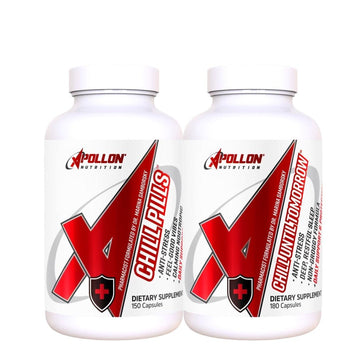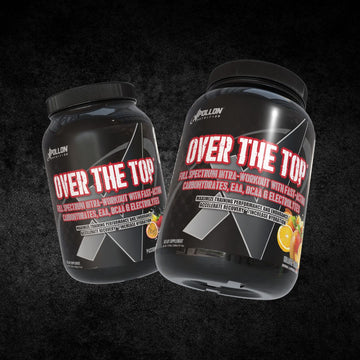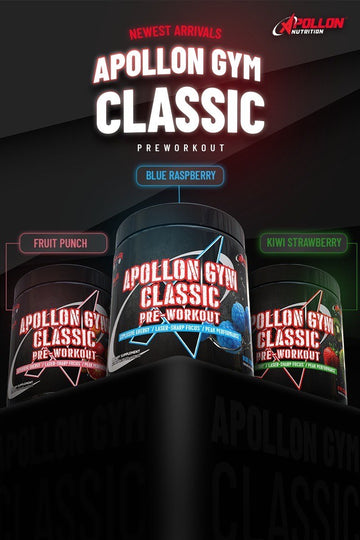How many times have you felt overwhelmed, overworked, and underappreciated?
Probably more times than you’d care to remember.
These days of high stress make it damn near impossible to relax and enjoy an evening with your significant other or friends. You’re still on-edge, wound-up, and unable to just let go.
And sleep?
Forget about it!
No matter how mentally and physically exhausted you are, you can’t seem to fall asleep. Come morning, you’re more walking dead than human, and in this state, you can’t concentrate, work, or even be pleasant.
What wouldn’t you give to just be able to CHILL OUT at the end of a long day, relax with friends and family, and get the deep, rejuvenating sleep you need?!
Thankfully, Apollon Nutrition has engineered a pair of solutions for you in our new Chill series: Chill Pills & Chill Until Tomorrow.
As you’ll soon see, both products are quite similar, but the differences can make a tremendous difference on specifically when each product is optimally used.
Let’s begin by highlighting the similarities between the two.
Apollon Chill Main Features
KSM-66 Ashwagandha
- World’s leading premium ashwagandha extract standardized to 5% withanolides
- Used daily for 8 weeks has been shown in research to help reduce cortisol levels by 27.9% and lower Depression Anxiety Stress Scale (DASS) scores by a whopping 71.6%[1]
- Helps reduce the time it takes to fall asleep after lying down (also known as sleep latency)[2]
- Both low (250mg) and high (600mg) doses of KSM-66 ashwagandha have been found effective for reducing stress and anxiety as well as improving sleep quality[3]
Rhodiola Rosea
- Powerful botanical used in traditional healing systems throughout Europe and Asia for centuries
- As an adaptogen, rhodiola improves the body’s ability to perceive, interact and recover from various stressors, including both mental and physical
- Shown to reduce self-reported stress and anxiety and concomitant mood symptoms in healthy individuals with mild anxiety[4]
- Main adaptogen approved by the Committee on Herbal Medicinal Products/European Medicines Agency (HMPC/EMA) for the indication 'stress' and influences the release of stress hormones while boosting energy metabolism[5]
Curcumin
- Chronic stress is known to result in the development of mood and anxiety disorders
- Curcumin is a polyphenol found in turmeric that’s renowned for its anti-inflammatory, antioxidant, neuroprotective and antidepressant properties[6]
- Animal studies indicate that it may be valuable for individuals who are constantly subjected to social stress[7]
- A 2020 meta-analysis concluded that curcumin, as part of standard care, may benefit individuals with depressive or anxious feelings[8]
L-Theanine
- Amino acid found in tea leaves regarded for its ability to promote feelings of calmness without inducing sedation
- Known to increase levels of GABA (the primary calming neurotransmitter)
- Daily supplementation with L-Theanine has been shown to reduce stress-related symptom (e.g., depression, anxiety, poor sleep) scores and improve cognitive function (e.g., verbal fluency and executive function) scores[9]
- Additional studies indicate it may positively influence dopamine and serotonin, further enhancing feelings of mood and overall well-being[10]
Saffron
- Contains a variety of phytoactives, including crocin and safranal, that help reduce feelings of stress and anxiety
- Found to offer comparable benefits to other pharmacological options used to combat depression when used daily for 6 weeks[11]
- Based on these findings, researchers believe that saffron may work by acting on a combination of serotoninergic, noradrenergic, and dopaminergic systems[12]
- May help to increase resilience against the development of stress-related conditions[12]
Magnesium Glycinate
- Essential mineral that’s utilized in 300+ biological processes, including protein synthesis, insulin release, blood pressure regulation, and muscle relaxation
- Low magnesium levels are associated with anxiety and poor sleep qualities (daytime falling asleep, sleepiness, snoring, and sleep duration).[13,14]
- Magnesium glycinate is a highly bioavailable form of magnesium that supports healthy magnesium levels as well as provides the body with additional glycine (another calming agent)
Chill Pills vs Chill Until Tomorrow: What’s the Difference?
As you can see, Chill Pills and Chill Until Tomorrow are quite similar, and both can be used for relaxation. The main difference is in the addition of two key sleep-promoting ingredients -- Melatonin and Zylaria.
Most of you will be familiar with melatonin. It’s the hormone that governs your sleep-wake cycle and plays a pivotal role in not only helping you fall asleep but also staying asleep through the night.
Melatonin also serves as a valuable antioxidant in the body and has been highlighted for its role in reducing headaches as well as supporting immune system functioning.
What is Zylaria?
Zylaria is a formidable, natural relaxation supplement from the reputable ingredient innovators, NuLiv Science -- the same company behind AstraGin.
Zylaria is a novel combination of:
- Xylaria nigripes extract (mycelium)
- NF-05 a Cuscuta chinensis (seed) extract
- NF- 01 Panax notoginseng (root) extract
Xylaria nigripes is an edible fungus, abundant in polysaccharides, that has traditionally been used to treat anxiety, insomnia, and neurodegenerative disorders.
Cuscuta chinensis contains high levels of flavonoids, phenolic acids, and polysaccharides and has been found in various studies to possess antioxidant, anti-inflammatory, anti-depressant, and anti-aging effects.
Panax notoginseng (one of the components of AstraGin) is a staple of traditional Chinese medicine that is rich in ginsenosides, benefits cognitive function and offers neuroprotection.
What Does Zylaria Do?
Studies involving neuron cells found that Zylaria improves GABA production and reduces the activity of GABA transaminase, the enzyme that breaks down GABA.[15]
In other words, Zylaria helps you chill out in two complementary ways -- it increases the production of the body’s primary “calming neurotransmitter” (GABA), it helps maintain GABA levels for longer by preventing its breakdown.
Apollon Chill Until Tomorrow includes an impressive 1,000mg per full serving.
Chill Pills vs Chill Until Tomorrow: Which One Should I Use?
This ultimately boils down to when you’re planning to use Apollon Chill series products. To avoid feeling groggy during the day/early evening, we suggest only using Chill Until Tomorrow 30-60 minutes before bed.
For stress-relief and mood support during the daytime/early evening, we suggest Chill Pills. However, if you sleep aid without melatonin, then you can use Chill Pills before bed.
Stacking Options
Apollon Chill Pills or Chill Until Tomorrow may be stacked with the following products:
- 50/50 Formula-X
- Egg-Cellent
- ISOBLAST
- 50/50 Formula-V
- RESISTANCE
- KIDNEY KINDNESS
- TUDCA
- COLLAGEN
- HARD TARGET
- Mind Games
- Chainsaw
- Enigma
- Bloody Hell
References
- Chandrasekhar K, Kapoor J, Anishetty S. A prospective, randomized double-blind, placebo-controlled study of safety and efficacy of a high-concentration full-spectrum extract of ashwagandha root in reducing stress and anxiety in adults. Indian J Psychol Med. 2012 Jul;34(3):255-62. doi: 10.4103/0253-7176.106022. PMID: 23439798; PMCID: PMC3573577.
- Langade D, Kanchi S, Salve J, et al. (September 28, 2019) Efficacy and Safety of Ashwagandha (Withania somnifera) Root Extract in Insomnia and Anxiety: A Double-blind, Randomized, Placebo-controlled Study. Cureus 11(9): e5797. DOI 10.7759/cureus.5797
- Kelgane S B, Salve J, Sampara P, et al. (February 23, 2020) Efficacy and Tolerability of Ashwagandha Root Extract in the Elderly for Improvement of General Well-being and Sleep: A Prospective, Randomized, Double-blind, Placebo-controlled Study. Cureus 12(2): e7083. DOI 10.7759/cureus.7083
- Cropley, M., Banks, A. P., & Boyle, J. (2015). The Effects ofRhodiola roseaL. Extract on Anxiety, Stress, Cognition and Other Mood Symptoms. Phytotherapy Research, 29(12), 1934–1939. doi:10.1002/ptr.5486
- Anghelescu, Ion-George; Edwards, David; Seifritz, Erich; Kasper, Siegfried (2018). Stress management and the role of Rhodiola rosea: a review. International Journal of Psychiatry in Clinical Practice, 22(4):242-252.
- Aubry AV, Khandaker H, Ravenelle R, Grunfeld IS, Bonnefil V, Chan KL, Cathomas F, Liu J, Schafe GE, Burghardt NS. A diet enriched with curcumin promotes resilience to chronic social defeat stress. Neuropsychopharmacology. 2019 Mar;44(4):733-742. doi: 10.1038/s41386-018-0295-2. Epub 2018 Dec 12. PMID: 30542090; PMCID: PMC6372632.
- Lopresti, A.L. Potential Role of Curcumin for the Treatment of Major Depressive Disorder. CNS Drugs 36, 123–141 (2022). https://doi.org/10.1007/s40263-022-00901-9
- Fusar-Poli L, Vozza L, Gabbiadini A, Vanella A, Concas I, Tinacci S et al (2019) Curcumin for depression: a meta-analysis. Crit Rev Food Sci Nutr:1–11. https://doi.org/10.1080/10408398.2019.1653260
- Hidese S, Ogawa S, Ota M, Ishida I, Yasukawa Z, Ozeki M, Kunugi H. Effects of L-Theanine Administration on Stress-Related Symptoms and Cognitive Functions in Healthy Adults: A Randomized Controlled Trial. Nutrients. 2019 Oct 3;11(10):2362. doi: 10.3390/nu11102362. PMID: 31623400; PMCID: PMC6836118.
- Wang, L., Brennan, M., Li, S., Zhao, H., Lange, K. W., & Brennan, C. (2022). How does the tea L-theanine buffer stress and anxiety. Food Science and Human Wellness, 11(3), 467–475. https://doi.org/https://doi.org/10.1016/j.fshw.2021.12.004
- Hausenblas HA, Saha D, Dubyak PJ, Anton SD. Saffron (Crocus sativus L.) and major depressive disorder: a meta-analysis of randomized clinical trials. J Integr Med. (2013) 11:377–83. 10.3736/jintegrmed2013056
- Jackson PA, Forster J, Khan J, Pouchieu C, Dubreuil S, Gaudout D, Moras B, Pourtau L, Joffre F, Vaysse C, Bertrand K, Abrous H, Vauzour D, Brossaud J, Corcuff JB, Capuron L, Kennedy DO. Effects of Saffron Extract Supplementation on Mood, Well-Being, and Response to a Psychosocial Stressor in Healthy Adults: A Randomized, Double-Blind, Parallel Group, Clinical Trial. Front Nutr. 2021 Feb 1;7:606124. doi: 10.3389/fnut.2020.606124. PMID: 33598475; PMCID: PMC7882499.
- Boyle NB, Lawton C, Dye L. The Effects of Magnesium Supplementation on Subjective Anxiety and Stress-A Systematic Review. Nutrients. 2017 Apr 26;9(5):429. doi: 10.3390/nu9050429. PMID: 28445426; PMCID: PMC5452159.
- Arab A, Rafie N, Amani R, Shirani F. The Role of Magnesium in Sleep Health: a Systematic Review of Available Literature. Biol Trace Elem Res. 2023 Jan;201(1):121-128. doi: 10.1007/s12011-022-03162-1. Epub 2022 Feb 19. PMID: 35184264.
- Chang TC, Chang WL, Huang SF, et al. Effect of Xylaria nigripes, Panax notoginseng, Cuscuta chinensis on GABA, GABA transaminase, Glutamate decarboxylase, Amyloid beta, and Amyloid beta aggregation levels in PC12 neuron cells. J Biochem Biotech 2022;5(5):121






